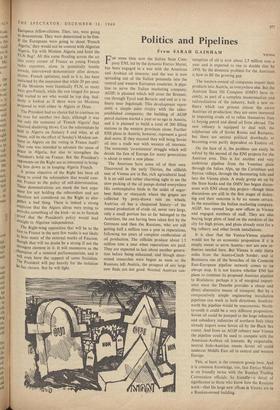Politics and Pipelines
From SARAH GAINHAM FOR some time now the Italian State Com- pany ENI, led by the dynamic Enrico Mattei, has been engaged in a war with the American and Arabian oil interests; and the war is now spreading out of the Italian peninsula into the central and western European countries. A pipe- line to serve the Italian marketing company, AGIP, is planned which will cross the Brenner, run through Tyrol and Bavaria and end at a re- finery near Ingolstadt. This development repre- sents a simple sales rivalry with the older- established companies; the building of AGIP petrol stations started a year or so ago in Austria, and it is planned to build a total of 200 filling stations in the western provinces alone. Further ENI plans in Austria, however, represent a good deal more. If they succeed they will bring Soviet oil into a trade war with western oil interests. The economic 'co-existence' struggle which will decide the fate of Europe for many generations is about to enter a new phase.
The Austrians have some oil of their own. Discovered in the early Thirties, the oilfields east of Vienna are in flat, rich agricultural land. It is an odd and rather charming sight to see the slow pecking of the oil pumps dotted everywhere like contemplative birds in the midst of sugar- beet fields or vineyards where the grapes are collected by pony-drawn vats on wheels. Austrian oil has a chequered history—of the annual production of crude oil, never very large, only a small portion has so far belonged to the Austrians, the rest having been taken first by the Germans and then the Russians, who are still getting half a million tons a year in reparations, following ten years of complete confiscation of oil production. The oilfields produce about 1.5 million tons a year when reparations are paid. They are expected to last about another genera- tion before being exhausted, and though deter- mined researches were begun as soon as the Russians left Austria, the prospect of any large new finds are not good. Normal Austrian con- sumption of oil is now about 2.5 million tons a year and is expected to rise to double that by 1970. So the domestic problem for the Austrians is how to fill the growing gap.
The western-owned oil companies import their products into Austria, as everywhere else. But the Austrian State Oil Company (OMV) have re- cently, as part of a complete modernisation and rationalisation of the industry, built a new re- finery which can process almost the entire Austrian oil production; they are more interested in importing crude oil to refine themselves than in buying petrol and diesel oil from abroad. The new refinery is equipped to deal with the sulphurous oils of Soviet Russia and Rumania; but there are serious political drawbacks to becoming even partly dependent on Eastern oil.
On the face of it, the problem can easily be solved by the second of the ENI projects for the Austrian area. This is for another and very ambitious pipeline from the Venetian plain through the Julian Alps, up the Carinthian and Styrian valleys, through the Semmering hills and into the Vienna plain. A study group set up by the State banks and the OMV has begun discus- sions with ENI about this project—though these discussions are still in the first stages of dicker- ing and their outcome is by no means certain. In the meantime the Italian marketing company, AGIP, has opened large new offices in Vienna and engaged numbers of staff. They are also buying large plots of land on the outskirts of the city for high prices, and plans already exist for a big refinery and other lavish installations.
It is clear that the Venice-Vienna pipeline would not be an economic proposition if it is simply meant to serve Austria—nor are new re- fineries needed here. But Vienna is only thirty miles from the Austro-Czech border; and at Bratislava one of the branches of the Comecon East-European pipeline network comes to an abrupt stop. It is not known whether ENI has plans to continue its proposed Austrian pipeline to Bratislava; perhaps it is of marginal import- ance since the Danube provides a cheap and direct alternative means of transport. But by a comparatively simple engineering installation pipelines can work in both directions. South-to- north the pipeline would be uneconomic. North- to-south it could be a very different proposition.
Soviet oil could be pumped to the large refineries and subsidiary industries of northern Italy (they already import some Soviet oil by the B1ack Sea route). And from an AG1P refinery near Vienna the pipeline could be used to compete with the American-Arabian oil interests. By respectable, neutral Italo-Austrian means Soviet oil could undercut Middle East oil in central and western Europe.
This, at least, is the common gossip here. And it is common knowledge, too, that Enrico Mattei is on friendly terms with the Russian Trading Commission officials. So friendly—a detail of significance to those who know ho'w the Russians work—that his large new offices in Vienna are in a Russian-owned building.


































 Previous page
Previous page